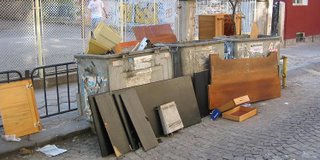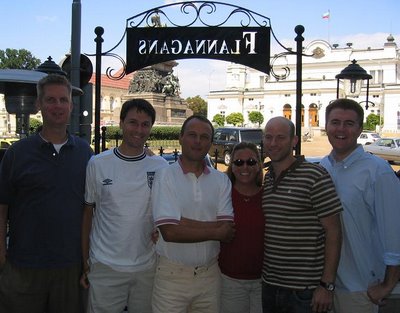Road Trip
September 22 is Independence Day in Bulgaria, so we have a 3-day weekend. Ryan, Kat, Ian, and I decided what better way to celebrate this than a road trip to another country. So, Friday morning we all packed into her car and headed for the border. The road trip itself was rather uneventful as the highways in Serbia are generally nicer than in Bulgaria; at times, we could imagine we were driving on a rural interstate in middle America. On the way back we discussed whether it looked more like western Ohio (my choice), Iowa, or Kentucky—you get the idea. Furthermore, we were 4 Americans riding in an SUV listening to American music from our iPods; the only thing that hinted to our location was the occasional sign listing the towns and villages we were passing in Cyrillic and Latin.
Beograd
We only had a map of downtown Beograd (I can’t figure out why we call it Belgrade,) but amazingly had little problem finding our hotel in the old town. Arriving in the late afternoon, we again had a hard time finding lunch (as Ben & I did 2 years ago; click here and scroll down to day 7), but we eventually satiated our hunger and thirst. Over the next two days we explored area churches and museums centering around Knez Mihailova Street—a beautiful pedestrian area in the heart of the old town, again something sorely missing in Sofia. Saturday afternoon we took a one and a half hour boat tour up and down the Sava River, which was nice except for the industrial areas on the Sava; they should have shown us more of the Danube instead. Sunday, before we left, we head west to the town Zemun, which used to mark the eastern extent of the Austro-Hungarian Empire, and retains much of the architectural elements of this civilization. This is one of the nice benefits of having a car; we would not have made the effort by bus or taxi.
Serbo-Croatian
The Serbian, Croatian, and Bosnian languages are actually dialects of each other (but, since each hates each the other’s guts, they insist that they each have a unique language.) Like Bulgarian, Serbo-Croatian is a Slavic language, and aside from Macedonian (which, in reality is a dialect of Bulgarian) is most closely related to Bulgarian—much like German and Dutch, I suppose. As such, we were able to make out most signs and understand a good bit of what people said (OK, not me, but Kat—she studied Bulgarian for 5 months versus our 2 months.) However, none of us felt comfortable trying to speak it for fear of being doubly wrong; at least in Bulgaria people can tell we are trying to speak their language. Serbs could probably understand a Bulgarian, but not necessarily an American’s mangled Bulgarian. One interesting difference is that this language has a direct, official, and unambiguous mapping to a (modified) Latin alphabet (e.g. the “sh” sound made by the Cyrillic ш is represented in Latin as š.) Practically, this means the more universal Latin alphabet is increasingly used in Serbia (and already exclusively in Croatia.) Bulgaria, on the other hand, will never abandon the Cyrillic alphabet, as they take pride in the fact that Cyril and Methodius invented it here.
Diplomatic Immunity!1
At the border, there was a line of truck on both sides waiting to clear customs at least 2 or 3 miles long; we estimate that many of them would be there for at least 12 hours. Passenger vehicles, on the other hand, could carefully pass trucks along the winding 2-lane road leading to the border. We had even another advantage when we reached the border complex (exit control, disinfection, immigration, customs, and road tax booths); since Kat was a foreign service officer, and her vehicle had diplomatic tags, we were whisked in front of everyone into the corps diplomatique express line. I couldn’t help but chuckle “ha, suckers!” at the mere mortals who had to wait an additional half hour.
Contest
Since three of us are bloggers, there is now an unofficial contest going. I obviously win the “quickest to blog” award since I posted part of this from an Internet café on Saturday. Ryan and Ian are now vying for the most interesting and most humorous awards.
1Lethal Weapon 2. 1989. [IMDB]
23 September 2006
11 September 2006
Scavengers
Friday afternoon was a moving day of sorts at Serdon. Namely, we were moving stuff that had been accumulating over the years from the attic storage room to the new apartment (which will be renovated into new offices) and—more often—to the dumpsters on the street. It was a dusty, dirty, and strenuous affair; the attic is five floors up and there is no elevator in this building. After the first trip down to the street, I wondered how long it would take before gypsies…er,  Roma would show up to scavenge recyclable metal from the junk we were brining down. Well, I quickly found out, because on the second trip, they were already there picking through the old furniture and office equipment, prying and hacking off any piece of metal for which they could get a few stotinki. Later that afternoon, I took this picture; note, the only thing left is wood and plastic—impressive.
Roma would show up to scavenge recyclable metal from the junk we were brining down. Well, I quickly found out, because on the second trip, they were already there picking through the old furniture and office equipment, prying and hacking off any piece of metal for which they could get a few stotinki. Later that afternoon, I took this picture; note, the only thing left is wood and plastic—impressive.
Farewell Julia
On Sunday, we had an (inexplicably German) brunch at Flannagans (Raddison Hotel) for Julia, and then another get-together that evening in advance of her returning to the USA—in fact, tonight she will already be back in her native Chicago, where she will likely be able to continue to practice her Bulgarian with cab drivers. (inside joke: Julia has a lot of colorful taxi stories from Sofia, and Chicago does indeed have a large Bulgarian population.)
Below are the men of the MBA Enterprise Corps, inconsiderate as always, standing in front of the guest of honor, Julia—the only female of the 2005 Corps—on her last day in Sofia. Thanks for putting up with us for 13 months! Left to right: Mike (formerly MBAEC in Romania), Ryan, myself, Julia, Paris, Ian (2006 Corps.) The Bulgarian national parliment is behind us.

 Roma would show up to scavenge recyclable metal from the junk we were brining down. Well, I quickly found out, because on the second trip, they were already there picking through the old furniture and office equipment, prying and hacking off any piece of metal for which they could get a few stotinki. Later that afternoon, I took this picture; note, the only thing left is wood and plastic—impressive.
Roma would show up to scavenge recyclable metal from the junk we were brining down. Well, I quickly found out, because on the second trip, they were already there picking through the old furniture and office equipment, prying and hacking off any piece of metal for which they could get a few stotinki. Later that afternoon, I took this picture; note, the only thing left is wood and plastic—impressive.Farewell Julia
On Sunday, we had an (inexplicably German) brunch at Flannagans (Raddison Hotel) for Julia, and then another get-together that evening in advance of her returning to the USA—in fact, tonight she will already be back in her native Chicago, where she will likely be able to continue to practice her Bulgarian with cab drivers. (inside joke: Julia has a lot of colorful taxi stories from Sofia, and Chicago does indeed have a large Bulgarian population.)
Below are the men of the MBA Enterprise Corps, inconsiderate as always, standing in front of the guest of honor, Julia—the only female of the 2005 Corps—on her last day in Sofia. Thanks for putting up with us for 13 months! Left to right: Mike (formerly MBAEC in Romania), Ryan, myself, Julia, Paris, Ian (2006 Corps.) The Bulgarian national parliment is behind us.

Subscribe to:
Posts (Atom)